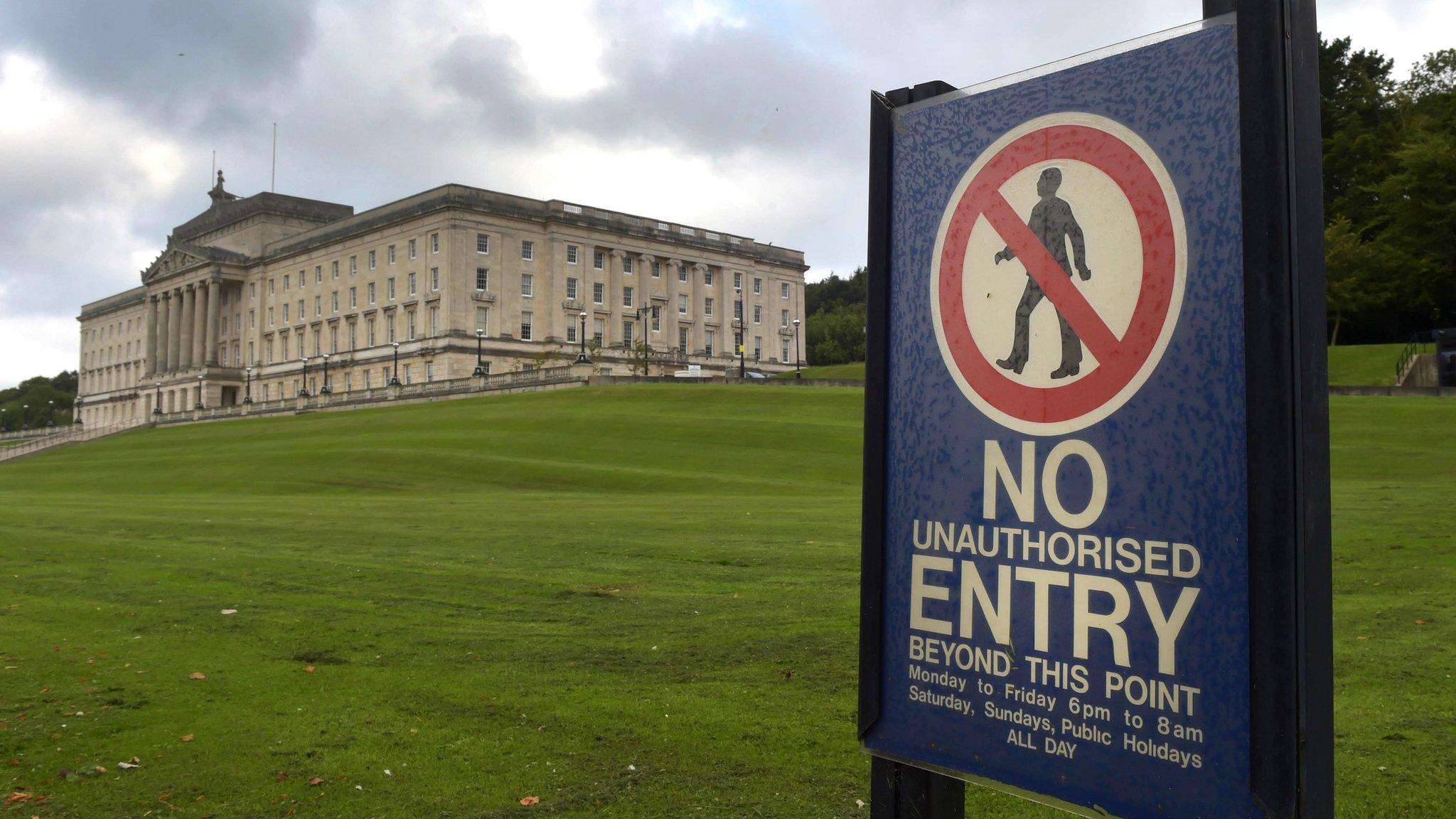NI first minister Peter Robinson steps aside in Stormont crisis
- Published
Chris Buckler: "From the balconies of the Great Hall, they watched devolution fall apart"
Northern Ireland First Minister Peter Robinson has stepped aside and other DUP ministers have resigned as a result of the political crisis at Stormont.
He has asked his party colleague Arlene Foster to take over as acting first minister, after the DUP failed to get enough support to adjourn the assembly.
Prime Minister David Cameron said he was "gravely concerned" but it would not be right to suspend the assembly.
The crisis was sparked by the murder of ex-IRA man Kevin McGuigan, last month.
Police said that IRA members may have been involved in the killing.
'To the brink'
The political row escalated on Wednesday, when detectives arrested three senior republicans as part of the murder inquiry, including Sinn Féin's chairman in Northern Ireland, Bobby Storey.

Bobby Storey (left), Eddie Copeland (centre) and Brian Gillen (right) are leading republicans who were questioned and released in the McGuigan murder inquiry
All three men were released unconditionally on Thursday evening and Mr Storey's lawyer said he plans to sue for unlawful arrest.
With the exception of Mrs Foster, the DUP's ministers have all signed their letters of resignation.
Mr Robinson said: "The failure of the SDLP and Sinn Féin to implement the Stormont House Agreement, together with the assessment of the chief constable of the involvement of the IRA in murder, the continued existence of IRA structures, and the arrests that followed has pushed devolution to the brink," the DUP leader said.
'Gatekeeper role'
"In light of the decision by republicans, nationalists and the Ulster Unionist Party to continue with business as usual in the assembly, I am therefore standing aside as first minister and other DUP ministers will resign with immediate effect with the exception of my colleague Arlene Foster."
The DUP leaded added he has "stepped aside but not technically resigned" and has asked Mrs Foster to play a "gatekeeper role".
"Arlene remaining in post allows us to ensure that no irrational financial decisions are taken by other parties in what might appear to be the last number of days of this assembly," he added.
Mr Robinson said he will not take his salary and will not carry out any departmental work at Stormont while Mrs Foster is in post as acting first minister.
Sinn Féin's Gerry Kelly said Mr Robinson's decision to step aside instead of announcing his resignation was intended to avoid an election.
"The DUP are afraid of an election," Mr Kelly said.
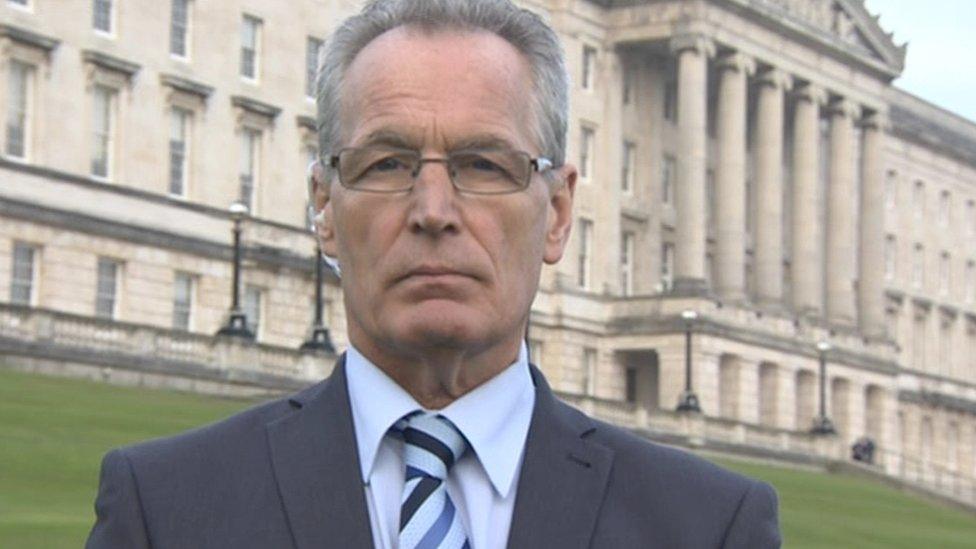
Sinn Féin's Gerry Kelly told BBC Newsline that Mr Robinson had not technically resigned because the DUP wanted to avoid an election
A Downing Street spokesperson said the Prime Minister had spoken with Mr Robinson on Thursday afternoon and was "gravely concerned about the situation in Northern Ireland".
'Paramilitary activity'
"While acknowledging the gravity of the situation, the Prime Minister told Mr Robinson that the UK government did not believe it would be right to introduce emergency legislation now to suspend the assembly.
"They discussed options for what more the UK government could do to comprehensively address all remaining paramilitary activity in Northern Ireland.
"The Prime Minister underlined the need for intensive cross-party talks to identify ways to tackle all paramilitary groups and to get on with implementation of the Stormont House Agreement
Theresa Villiers said today had been a "bad day for the Northern Ireland political process"
'Complete breakdown'
Earlier, Northern Ireland Secretary Theresa Villiers told a press conference that she would not suspend the assembly despite the DUP resignations.
She said the latest developments were "a sign of a complete breakdown in the working relationships within the executive".
"There is an urgent need to get the parties together, find a way to repair those working relationships and address the two issues," she added.
"We did not think the circumstances will justify suspension, that has not changed and obviously suspension would not resolve the two big problems we face, implementation of the Stormont House Agreement and the presence of paramilitary organisations."

Analysis: Mark Devenport, BBC Northern Ireland political editor
In some ways the situation is not quite as grave as had been thought earlier today.
The DUP has not pulled out all its ministers as Peter Robinson had said he would yesterday.
Instead he has stepped aside and Arlene Foster will be in place as acting first minister for six weeks - that's how long an acting FM can remain in place.
There will be no suspension as in the words of the Secretary of State "the time is not right".
It would seem that Peter Robinson was left in no doubt that the government was not offering the option of immediate suspension. And despite pressure on the SDLP from the Irish government, they did not offer the DUP the lifeline of voluntary adjournment.
It looks like Mr Robinson has come up with a clever tactic which gives the government six weeks to rescue the situation.

Last month, Northern Ireland's police chief said the IRA still existed and that detectives believed some IRA members had a role in Mr McGuigan's murder.
But Chief Constable George Hamilton added that there was no evidence at that stage that the murder was sanctioned by the IRA, which he said was committed to politics and not engaged in terrorism.
However, Sinn Féin's leadership has insisted that the IRA no longer exists and said the murder was being exploited by enemies of the peace process.
- Published11 September 2015
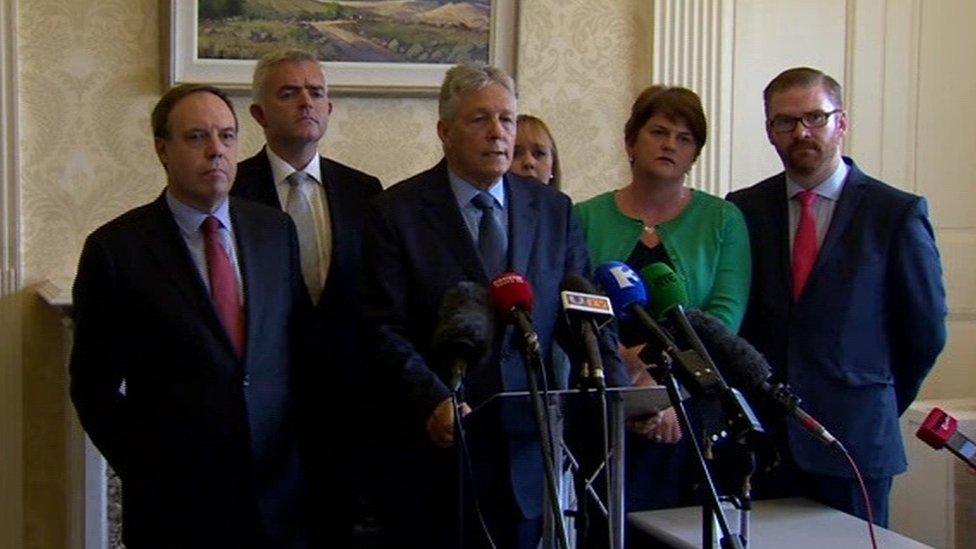
- Published10 September 2015
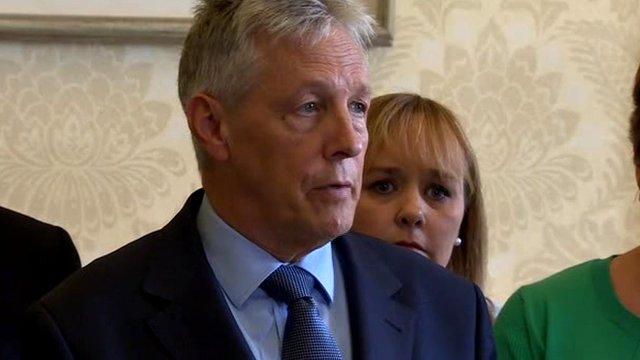
- Published11 September 2015
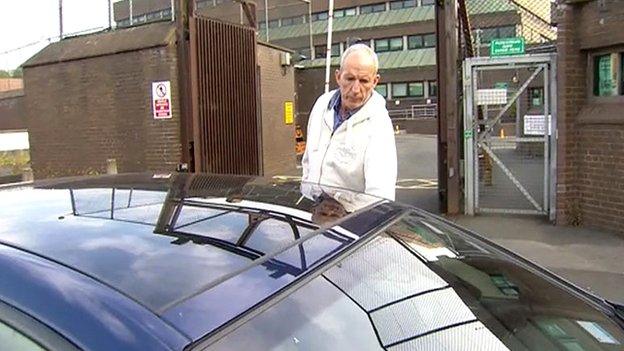
- Published13 November 2015
